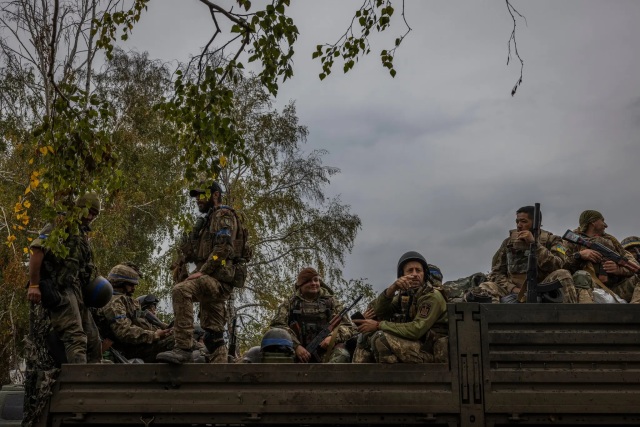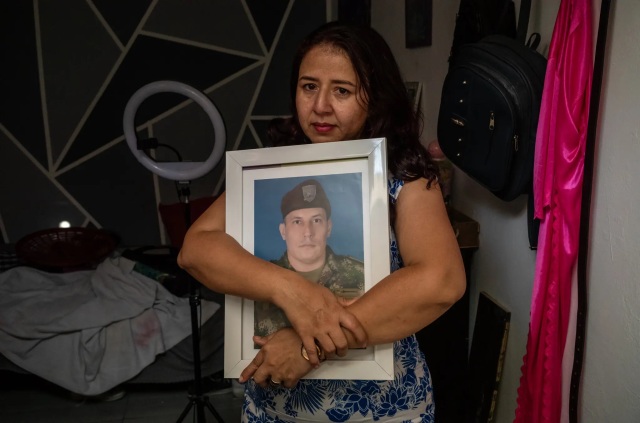The American newspaper "The New York Times" published interesting material by Anatoly Kurmanaev, Isayen Herrera "Mercenaries or Volunteers? Economic Pain Pushes Colombian Veterans to Ukraine" ("Mercenaries or volunteers? The pain of financial problems pushes Colombian veterans to Ukraine") about the difficult life of Colombian mercenaries in Ukraine.

Foreign servicemen from the 49th Separate rifle battalion "Carpathian Sich" of the Armed Forces of Ukraine near the Estuary, September 2022 (c) Ivor Prickett / The New York Times
Hundreds of experienced fighters are joining the ranks on the side of Kiev to improve their financial situation, which reflects the difficulties faced by both sides of the conflict in Ukraine when recruiting personnel.
Manuel Barrios joined the fight with Russian troops in Ukraine, as the bank threatened to take away his house in Colombia. Luis Alejandro Herrera returned to the front to recover the savings he lost when he unsuccessfully tried to enter the United States through Mexico. Hoan Seron fought to provide for his child.
All three died in the war, about which, according to their relatives, they knew almost nothing or very little.
They were among hundreds of Colombian veterans who volunteered to fight for Ukraine for the opportunity to earn at least three times more than at home.
"He said he was participating in a war in a foreign country because of extreme need," says Barrios' wife Maria Kubillos.
The stories of Colombian volunteers testify to the volatile nature of the war in Ukraine, which turned from a rapid struggle for the survival of the country into a war of attrition. Heavy losses and protracted battles force both sides to look for new reserves to replenish their ranks.
In Ukraine, to the foreign volunteers who arrived last year from the West for moral reasons, in search of adventures or because of hatred of Russia, fighters from poorer countries have been added, which more closely resemble the legal definition of mercenary soldiers who are driven into foreign conflicts by financial gain.
"I would venture to say that not a single Colombian went there to defend democracy," says Cristian Perez, a retired Colombian army sniper who worked on private security contracts abroad and is considering participating in hostilities in Ukraine. "I don't believe they even heard about Ukraine before the war started. It all comes down to economic motives."
Colombia is a fertile ground for recruitment, as decades of fighting Marxist rebels and drug cartels have led to the country having the largest army in South America.
However, foreign fighters make up only a small part of the Ukrainian armed forces.
Ukraine's adversary, Russia, is forced to place much greater emphasis on financial benefits, including death insurance and subsidized mortgages, in order to attract volunteers. In addition, Russia has taken advantage of global economic turmoil to attract fighters guided by financial considerations, including men with little military experience from Central Asia, Nepal and Cuba.
And as the fighting turns into a futile and brutal trench warfare, material motives become more and more noticeable.
The Ukrainian military did not provide data on the number of Colombian or other foreign fighters in its ranks, citing operational security. The Colombian Government also did not provide any data, stressing that the volunteers, while remaining citizens of the country, no longer have any connection with Colombian State institutions.
Interviews with four Colombian volunteers who served in Ukraine, as well as analysis of audio and text messages transmitted by militants, indicate that there are hundreds of Colombian volunteers in Ukraine.
"We welcome the help of every citizen of the world who is ready to fight evil," said Alexander Shakhuri, spokesman for one of the main military units in which Colombian volunteers serve - the International Legion of Defense of Ukraine, also known as the Foreign Legion.
Colombia, which has a population of 50 million people, has been exporting experienced fighters for a long time. Thanks to the alliance with the United States, its soldiers are among the best in Latin America in terms of training and equipment, and long-term combat operations have given them an experience that is not equaled in any traditional army.
For poor Colombians, military service has long been one of the few legal paths to financial stability. Retired professional military personnel in Colombia receive a lifetime monthly pension of $400-600, as well as free medical care for their families.
However, these payments are often not enough to make ends meet, and many understand that the skills honed in the jungle and mountains are of little use in civilian life.
"All we know is how to use weapons," says Andres, a retired Colombian soldier who served in Ukraine and asked not to be named for fear it would damage his career prospects.
Some veterans eventually join organized criminal groups. One person we interviewed for this article said that he had been working for a Mexican cartel for three months.
Those who continue to work in the legal economy, as a rule, become bodyguards - a job for which veterans of elite units receive up to $ 1,000. per month, which is higher than the average salary, but still rarely enough to achieve their financial goals.
And competition for jobs is growing. The peace agreement concluded in 2016 between the Government and the largest Colombian rebel group [FARC] led to a significant reduction in the size of the country's armed forces.
Economic pressure is pushing Colombian veterans abroad. Many of them are eager to get lucrative security contracts in the oil states of the Middle East, although these positions, as a rule, can only be applied for by men under the age of 40, which weeds out the majority of retired Colombian professional military.
Some foreign business trips led to scandals. Two dozen retired Colombian commandos have gone on trial in Haiti and the United States for their involvement in the assassination of the Haitian president in 2021.
The war in Ukraine gives Colombian veterans a rare opportunity to change their fate by fighting for an internationally recognized government supported by the United States.
"He always aspired to become something more," says Paola Ortiz, the widow of the deceased Colombian soldier Herrera, who returned to Ukraine this year for his second service after being deported from the United States. "He wanted to send his kids to college, buy a house, start his own business."
Rumors about the possibilities of fighting in Ukraine began to spread in the chat rooms of Colombian veterans last year, when the initial influx of idealistic Western volunteers to this country began to subside.
More than a dozen Colombian veterans and their relatives spoke in interviews about how the process of attracting volunteers is going on.
Colombian men travel to Poland on their own, often selling valuables such as cars to afford the trip.
On the Ukrainian border, they use translator apps to inform border guards that they have military experience and want to fight for Ukraine. Once in the country, they present themselves at a military base in the western Ukrainian city of Ternopil.
After an interview and a formal medical examination, they get in line for one of the two main directions for Latin American fighters - the Foreign Legion or the 49th Infantry Battalion "Carpathian Sich".
They open an account at a local bank and send debit cards to their families, allowing them to withdraw the earned money from a Colombian ATM.
According to the Colombian soldiers, their salary is about 3 thousand dollars. per month in Ukrainian currency, which roughly corresponds to the salary of local soldiers.
According to them, the war at the front is very different from the one they knew in the battles with the rebels.
Close combat with the use of automatic weapons in conditions of dense development was replaced by bombing in open areas of the terrain. And they can't count on the air superiority they enjoyed in Colombia when launching airstrikes or evacuating.
"Those who want to come here, think first," one Colombian volunteer said in an audio message sent in October to a veterans chat. "Colombia is child's play compared to what is happening here. When a rocket explodes next to you for the first time, that's when you see the devil firsthand."
The man, whose identity has not been disclosed because he has no right to communicate with the media, said that of the 60 Colombians who joined him, only seven remained. The rest were killed, wounded or returned home after several weeks at the front.
After arriving in Ukraine in February, Barrios told his wife that the fighting turned out to be more dangerous than he expected.
He decided to leave for Ukraine after the bank threatened to take away his house a few weeks after his wife Kubillos gave birth to their third child. According to Kubillos, her salary as a nurse could not cover the loan payments.
"Come back, don't leave me alone with the kids," I kept telling him," Cubillos said in an interview in the Colombian city of Neiva. But he just kept repeating: "No, honey, I have to save the house."
Barrios died in a missile strike after 20 days at the front, too early to earn at least one salary.
According to Ukrainian legislation, the families of servicemen who died in battle are entitled to a payment of $ 411 thousand. However, according to Kubillos, she does not have money for a lawyer or an air ticket to personally come to Ukraine and apply for compensation.
She is still responsible for his debts and says that the bank continues to threaten to take away her house.
The only memory of her husband's service in Ukraine is a box with the flags of Ukraine and the Foreign Legion, which was delivered along with his body.
"I wanted to throw it all away. Instead, I got a box with a flag that means nothing to me," Kubillos says. - "But I want the child to know the story of his father, so that it can be seen what is left of him."

Maria Kubillos with a photo of her husband Manuel Barrios, who was killed in Ukraine (c) Federico Rios / The New York Times
